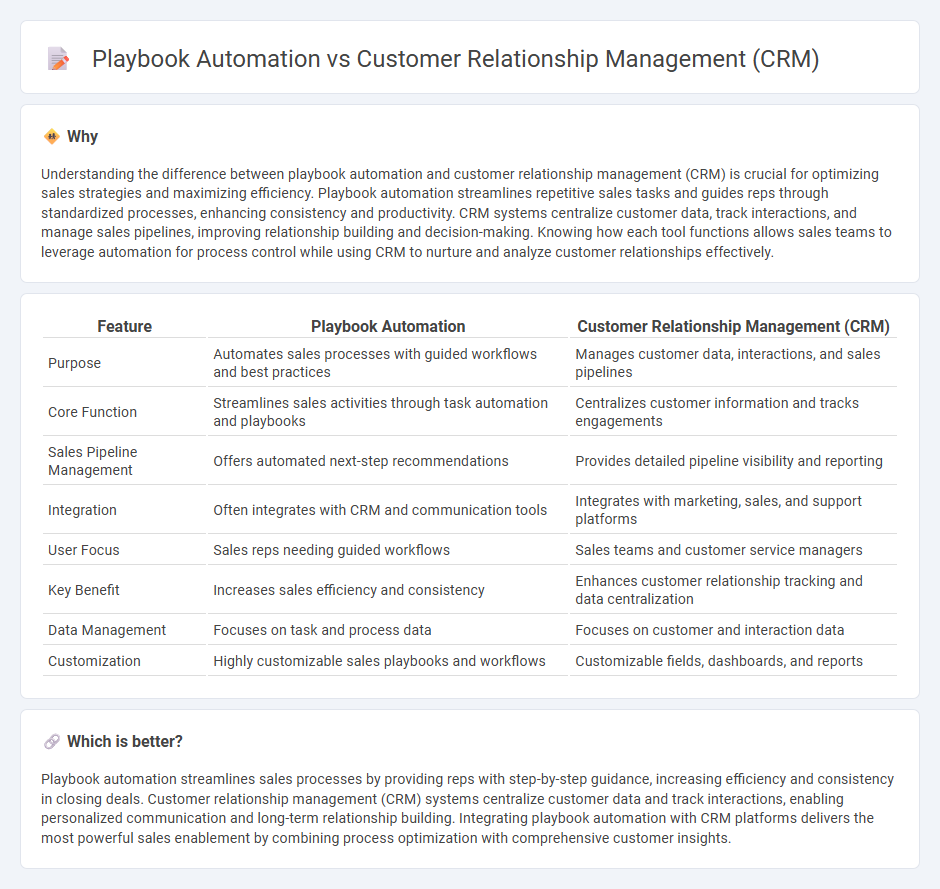
Sales playbook automation streamlines the scripting and process execution for sales teams, enhancing consistency and efficiency in lead engagement and conversion. Customer Relationship Management (CRM) systems centralize customer data, track interactions, and facilitate personalized communication to build stronger relationships and improve sales forecasting. Explore how combining sales playbook automation with CRM can optimize your sales strategy and boost revenue growth.
Why it is important
Understanding the difference between playbook automation and customer relationship management (CRM) is crucial for optimizing sales strategies and maximizing efficiency. Playbook automation streamlines repetitive sales tasks and guides reps through standardized processes, enhancing consistency and productivity. CRM systems centralize customer data, track interactions, and manage sales pipelines, improving relationship building and decision-making. Knowing how each tool functions allows sales teams to leverage automation for process control while using CRM to nurture and analyze customer relationships effectively.
Comparison Table
| Feature | Playbook Automation | Customer Relationship Management (CRM) |
|---|---|---|
| Purpose | Automates sales processes with guided workflows and best practices | Manages customer data, interactions, and sales pipelines |
| Core Function | Streamlines sales activities through task automation and playbooks | Centralizes customer information and tracks engagements |
| Sales Pipeline Management | Offers automated next-step recommendations | Provides detailed pipeline visibility and reporting |
| Integration | Often integrates with CRM and communication tools | Integrates with marketing, sales, and support platforms |
| User Focus | Sales reps needing guided workflows | Sales teams and customer service managers |
| Key Benefit | Increases sales efficiency and consistency | Enhances customer relationship tracking and data centralization |
| Data Management | Focuses on task and process data | Focuses on customer and interaction data |
| Customization | Highly customizable sales playbooks and workflows | Customizable fields, dashboards, and reports |
Which is better?
Playbook automation streamlines sales processes by providing reps with step-by-step guidance, increasing efficiency and consistency in closing deals. Customer relationship management (CRM) systems centralize customer data and track interactions, enabling personalized communication and long-term relationship building. Integrating playbook automation with CRM platforms delivers the most powerful sales enablement by combining process optimization with comprehensive customer insights.
Connection
Playbook automation streamlines sales processes by integrating with customer relationship management (CRM) systems to provide real-time guidance and actionable insights, enhancing lead management and deal closure rates. CRM platforms centralize customer data, enabling automated workflows within playbooks to personalize sales interactions and track performance metrics effectively. This connection increases sales team efficiency, improves customer engagement, and drives higher conversion rates through targeted, data-driven strategies.
Key Terms
Customer Relationship Management (CRM):
Customer Relationship Management (CRM) systems centralize customer data, streamline interactions, and enhance sales and support processes through automation and analytics. Unlike playbook automation, CRM platforms focus on building long-term customer relationships by tracking touchpoints, managing leads, and providing insights into customer behavior. Explore how CRM solutions can transform your customer engagement and drive business growth.
Lead Tracking
Customer relationship management (CRM) systems centralize lead tracking by consolidating contact information, interaction history, and sales pipeline data to enhance customer engagement and improve conversion rates. Playbook automation streamlines lead tracking by automating repetitive tasks, standardizing sales processes, and providing real-time guidance to sales teams, ensuring consistent follow-up and qualification standards. Explore how integrating CRM with playbook automation can optimize lead tracking efficiency and boost sales performance.
Contact Management
Customer Relationship Management (CRM) systems centralize contact management, enabling businesses to store, track, and analyze customer interactions and data efficiently. Playbook automation streamlines repetitive sales and customer engagement tasks within CRM platforms, ensuring consistent and timely follow-ups with contacts to boost conversion rates. Explore how integrating playbook automation within your CRM enhances contact management strategies and drives sales performance.
Source and External Links
What is CRM (Customer Relationship Management)? - TechTarget - CRM is a combination of practices, strategies, and technologies companies use to manage and analyze customer interactions and data to improve service, retention, and sales growth across multiple channels including websites, phone, and social media.
What Is CRM? | IBM - CRM involves integrated technologies that document, track, and manage customer relationships, supporting sales pipeline control, lead management, forecasting, and improving customer experience through analytics and communication tools.
What is CRM (customer relationship management)? Full guide - CRM helps sales teams track and drive revenue by centralizing customer data and automating workflows, enabling better lead tracking, pipeline visibility, and personalized customer engagement to boost conversion rates.
 dowidth.com
dowidth.com